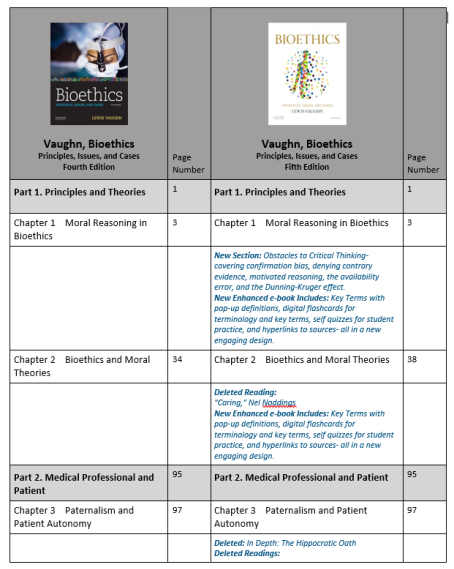Combines a wide variety of current readings, classic and contemporary cases, extensive explanations, and more robust pedagogy than any other text
Bioethics
Principles, Issues, and Cases
Fifth Edition
Lewis Vaughn
The Enhanced e-Book is now LIVE!

Click here to see a digital walkthrough of the enhanced e-book.
Enhanced e-Book: 978-0-19-760905-7, $47.95
Loose-leaf: 978-0-19-760903-3, $66.99
Paper: 978-0-19-760902-6, $94.95
About the Book
Bioethics: Principles, Issues, and Cases explores the philosophical, medical, social, and legal aspects of key bioethical issues. Opening with a thorough introduction to ethics, bioethics, and moral reasoning, it then covers influential moral theories and the criteria for evaluating them. Integrating eighty-nine readings, numerous classic bioethical cases, and abundant pedagogical tools, this text addresses the most provocative and controversial topics in bioethics.
About the Author
Lewis Vaughn is the author or coauthor of numerous books, including Philosophy: Here and Now, Fourth Edition (2022), The Power of Critical Thinking, Seventh Edition (2021), and Living Philosophy, Third Edition (2021), all published by Oxford University Press.
New to This Edition

A Chapter on Pandemic Ethics that addresses such issues as:
• Who gets life-saving resources when they are scarce? What moral principles should guide decisions?
• Why do racial and ethnic minorities have higher rates of COVID-19 and what should be done about it?
• What are the worst reasons—moral and nonmoral—for refusing masks and vaccines?
• Who should be blamed for spreading COVID falsehoods?
Click here to Preview Chapter 12: Pandemic Ethics.

A Chapter on Race, Racial Bias, and Healthcare that discusses such questions as:
• What is racism?
• Why is racism wrong?
• Does “systemic racism” exist?
• Are racial disparities in health real?
• Is there implicit bias in health care?
• What is racial profiling in medicine?
Click here to Preview Chapter 13: Race, Racial Bias, and Healthcare.

Expanded Chapter 1 (Moral Reasoning and Bioethics) to include a section on obstacles to critical thinking, covering confirmation bias, denying contrary evidence, motivated reasoning, the availability error, and the Dunning-Kruger effect

Updated chapters: 7 (Abortion), 10 (Euthanasia and Physician-Assisted Suicide), and 11 (Dividing Up Health Care Resources)

Additional Updates
• New developments in gene therapy
• The five main ways to do gene therapy
• Genetic testing for cancer risk
• Euthanasia and assisted suicide: major developments
• Oregon’s Death with Dignity Act
• U.S. Health care: the uninsured, per capita spending, and health care quality
• Comparing health care systems: U.S., Canada, and Germany

New readings, including:
• Michael Sandel with Colleen Walsh, “Why Some Americans Refuse to Social Distance and Wear Masks”
• Ezekiel J. Emanuel, Govind Persad, Ross Upshur, et al, “Fair Allocation of Scarce Medical Resources in the Time of Covid-19”
• Angela Ballantyne, “ICU Triage: How Many Lives or Whose Lives?”
• David R. Williams and Ronald Wyatt, “Racial Bias in Health Care and Health: Challenges and Opportunities”
• Michael Root, “Racial Profiling in Medicine”
Table of Contents
Preface
Part 1: Principles and Theories
Chapter 1. Moral Reasoning in Bioethics
Chapter 2. Bioethics and Moral Theories
Part 2: Medical Professional and Patient
Chapter 3. Paternalism and Patient Autonomy
Chapter 4. Truth-Telling and Confidentiality
Chapter 5. Informed Consent
Chapter 6. Human Research
Part 3: Life and Death
Chapter 7. Abortion
Chapter 8. Reproductive Technology
Chapter 9. Genetic Choices
Chapter 10. Euthanasia and Physician-Assisted Suicide
Part 4: Justice and Health Care
Chapter 11. Dividing Up Health Care Resources
Chapter 12. Pandemic Ethics
Chapter 13. Race, Racial Bias, and Health Care
Transition Guide
Please click here to download the Transition Guide for the Fifth Edition of Bioethics.
Digital Resources
All new print and electronic versions of Bioethics come with access to a full suite of engaging digital learning tools that work with the text to bring content to life and build critical thinking skills.
Digital Access to Bioethics includes:
• Enhanced e-book
• Oxford Learning Link
• Oxford Learning Link Direct
Save time in course prep with valuable tools available for download on Oxford Learning Link, your central hub for a wealth of engaging digital learning tools and resources to help you get the most of your Oxford University Press course material.
For Instructors:
• Instructor’s Manual with Test Bank
• PowerPoint Lecture Outlines
For Students:
• Self-quizzes
• Flashcards
• Helpful web links
Ethics in the Pandemic: Teacher Resources
The COVID-19 pandemic is a threat to tens of millions of people, and the medical and public health priorities are clear: prevent the virus’ spread and care for those who are affected.
But combating the disease also raises a host of ethical questions about medical triage and rationing care, politics and preventive measures, the integrity of medical research, medical misinformation, and more.
Teachers have been thinking about these questions, and there are many good sources that offer accurate, timely information on the virus and attempts to deal with its ethical implications.
Praise for Bioethics
Extremely well done for both undergraduate and graduate introduction to medical ethics courses. This text is comprehensive in its treatment of the issues I cover in my semester-length course on medical ethics."
– John Thomas Meadors, Mississippi College
I found the book to be fairly comprehensive; there is simply more to choose from in this book. It is up to date and the inclusion of stats and figures are still current and relevant."
– Kristemn Kringle-Bear, University of North Carolina Wilmington
Copyright © Oxford University Press 2026




